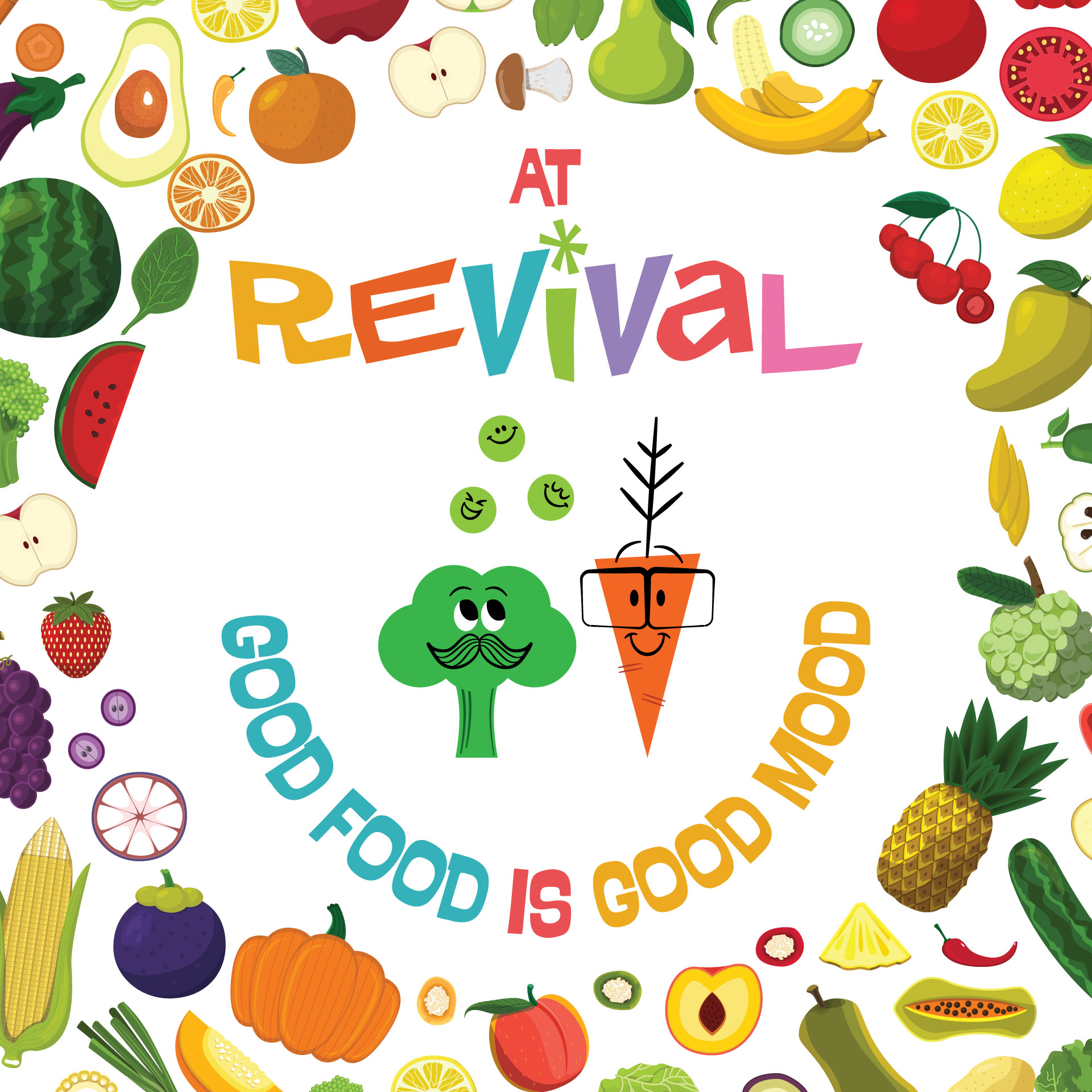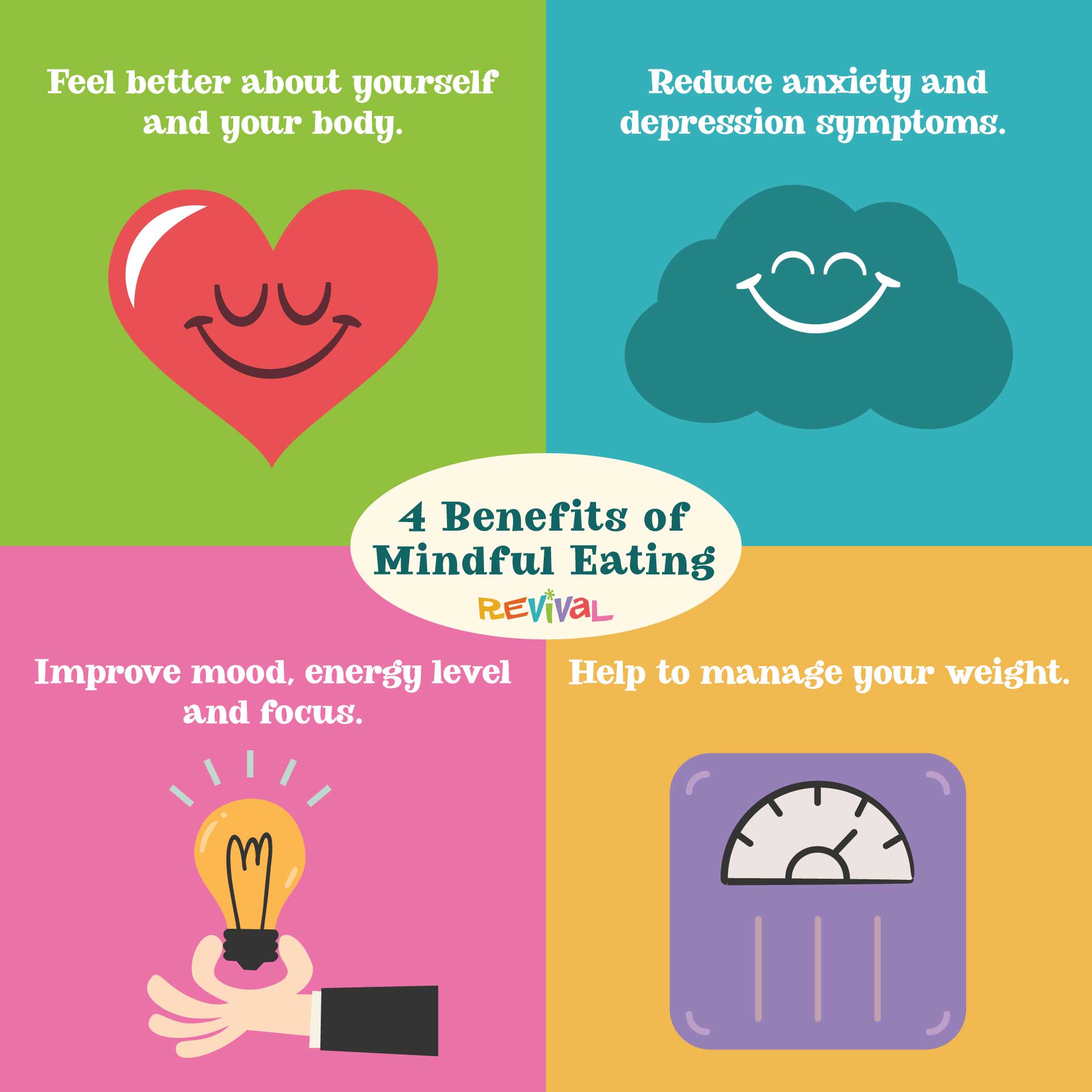Food & Mood

Nourishing Your Mental Health
At Revival we recognise the profound relationship between nutrition and mental wellbeing, we believe in the transformative power of food and its impact on mood, cognition, and overall mental health.
The food we consume has an influence far beyond satisfying our appetite, it intricately shapes our mental wellbeing. At the heart of this connection lies the fascinating interplay known as the gut-brain axis.
This intricate network of communication between the gut and the brain orchestrates a symphony of biochemical signals that profoundly impact our emotional and cognitive health.
Now the science bit:
Within the gut resides a complex ecosystem of trillions of microbes, collectively known as the gut microbiota, which play a pivotal role in this relationship. These microorganisms produce neurotransmitters, vitamins, and other signalling molecules that directly influence brain function and mood regulation.
Moreover, the gut-brain axis facilitates bidirectional communication, meaning that not only does the brain influence the gut, but the gut also exerts a powerful influence on the brain. Understanding and nourishing this symbiotic relationship through a balanced, nutrient-rich diet empowers us to optimize our mental health and emotional resilience.
What do you need to eat to support your mental wellbeing?
We know it can be difficult juggling life and knowing what is best to eat (that’s why we take all the hard work out for you and provide balanced and delicious dishes in Revival – click here to view our menu) but here is a short list to help you plan meals full of nutrients for Mental Wellness:

Omega-3 Fatty Acids: play a pivotal role in fostering emotional balance by supporting neurotransmitter function and reducing inflammation in the brain.
Vitamins and Minerals: Vitamins like B-complex and minerals like magnesium are instrumental in bolstering mental health, enhancing stress resilience, and optimizing cognitive function through their roles in neurotransmitter production, energy metabolism, and nerve function regulation.
Probiotics and Gut Health: A healthy gut microbiome is a cornerstone of mental wellbeing, influencing mood, cognition, and overall brain health. Nurturing a balanced gut ecosystem through a diverse, fibre-rich diet rich in probiotics and prebiotics is key to maintaining gut health and supporting mental wellbeing.
Balanced Diet and Mental Health: A well-rounded, balanced diet plays a pivotal role in promoting mental wellness by incorporating essential food groups like fruits, vegetables, whole grains, healthy proteins, and healthy fats, each contributing vital nutrients that support brain function, mood regulation, and overall mental health.

Eating Patterns and Mental Health
Mindful Eating:
Mindful eating, a practice rooted in awareness and attention to the present moment while consuming food, holds immense potential in enhancing mental wellbeing.
By engaging in mindful eating, individuals cultivate a deeper connection with their food, savouring each bite, and acknowledging sensations, flavours, and textures. This intentional approach not only reduces stress by promoting relaxation during meals but also fosters a positive relationship with food, encouraging a non-judgmental attitude towards eating habits.
Through heightened awareness of hunger cues and satiety, mindful eating supports better food choices and portion control, contributing to improved mental health and overall wellbeing.
Food and Mental Health Conditions
Depression and Anxiety:
Dietary strategies stand as a complementary force alongside traditional treatments in alleviating symptoms of depression and anxiety. Incorporating nutrient-rich foods such as fatty fish abundant in omega-3 fatty acids, whole grains rich in B vitamins, leafy greens packed with magnesium, and probiotic-rich foods like yogurt or kefir can play a pivotal role in supporting mental health.
Additionally, reducing the intake of processed foods, sugars, and excessive caffeine while maintaining regular meal times fosters stability in blood sugar levels and supports mood regulation. These dietary adjustments work synergistically with conventional treatments, potentially alleviating symptoms and contributing to a more holistic approach to mental wellness.
Stress Management:
Certain foods and nutrients hold remarkable potential in aiding stress reduction and managing stress-related symptoms. Incorporating stress-busting foods into one’s diet can offer a natural support system.
For instance, foods rich in magnesium, such as nuts, seeds, and leafy greens, help regulate cortisol levels, thus mitigating stress. Including complex carbohydrates from whole grains promotes the production of serotonin, the neurotransmitter linked to mood regulation, fostering a sense of calm.
Additionally, antioxidant-rich fruits and vegetables, like berries and colourful peppers, combat oxidative stress, while probiotic-rich foods, such as yogurt and fermented foods, support gut health, influencing the gut-brain axis and aiding stress resilience. These dietary choices, coupled with a balanced and varied diet, can serve as a powerful tool in managing stress and promoting overall mental wellbeing.
Practical Tips and Recipes
Incorporating mood-boosting foods into your daily meals can be a simple yet impactful way to prioritise mental wellbeing.
Start by including a colourful array of fruits and vegetables in your diet, aiming for a diverse selection to maximize nutrient intake.
Consider integrating omega-3-rich foods like chia seeds, or walnuts into meals a few times a week to support brain health and mood regulation.
Opt for whole grains like brown rice or quinoa, providing a steady source of energy and aiding in serotonin production.
Including probiotic-rich foods such as yogurt or kimchi promotes a healthy gut microbiome, positively influencing mood.
Don’t forget about hydration—staying well-hydrated with water and herbal teas can contribute to overall mood balance. Making these simple adjustments to your daily meals can pave the way for a diet that supports both physical and mental wellbeing. You can find out more about the benefits of herbal teas by visiting our trained herbalist in the Revival in-house Therapy Tea-Bar
Here are a few quick and easy recipes that incorporate ingredients known for their positive impact on mental health, including leafy greens, whole grains, tofu, and antioxidant-rich berries. Feel free to adjust the recipes to your taste preferences!
Quinoa and Veggie Buddha Bowl
Ingredients:
Instructions:
Spinach and Feta Stuffed Mushrooms
Ingredients:
Instructions:
Veggie Stir-Fry with Tofu
Ingredients:
Instructions:
Berry and Spinach Smoothie Bowl
Ingredients:
Instructions:
At Revival, we believe in the power of food as a tool for enhancing mental wellbeing.
We hope you join us on this journey of understanding how what we eat plays a pivotal role in nourishing not just our bodies, but also our minds.
Resources and Further Reading:
https://www.mind.org.uk/information-support/tips-for-everyday-living/food-and-mental-health/
https://www.bda.uk.com/resource/food-facts-food-and-mood.html
https://www.bmj.com/content/369/bmj.m2382
https://www.mentalhealthfirstaid.org/external/2018/03/relationship-food-mood/
















